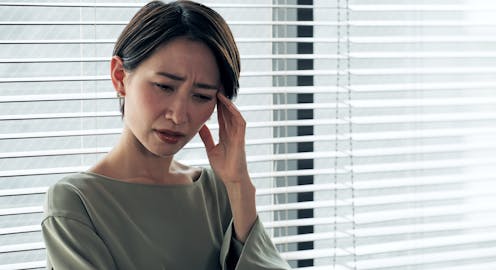Symptoms of menopause can make it harder to work. Here's what employers should be doing
- Written by The Conversation

How menopause affects women’s working lives has been shrouded by stigma for decades.
But this is starting to change. Australian journalist Imogen Crump’s recent on-air hot flush and her remark “I don’t think hormones respect national television” drew applause for its candour.
The federal parliament has menopause firmly on its radar with an inquiry set to explore the economic, physical, mental and emotional effects of this typically natural transition.
The inquiry will also investigate why awareness, availability and usage of workplace supports remains low. It’s not enough for employers to offer supports – employees need to be confident enough to access them.
Our global review of organisational supports for menstruation and menopause found workplaces play a pivotal role in breaking menopausal taboos. With the right interventions, workplaces can enable employees to manage their symptoms and remain in the workforce.
3 in 4 women experience troubling symptoms
Menopause is when a woman or person who menstruates stops having their period for at least 12 months.
Most people who menstruate transition to menopause and experience perimenopausal symptoms between 45 and 60 years of age.
Symptoms commonly include hot flushes, night sweats, cognitive disruptions known as “brain fog”, anxiety, depressive symptoms and disturbed sleep.
Read more: Perimenopause usually begins in your 40s. How do you know if it has started?
For some people, menopausal symptoms can be brief and cause little discomfort. But around 25% of women experience symptoms that profoundly affect their daily working lives.
Why menopause is a workplace issue
The government’s focus on prolonging workforce participation, together with its workplace equality agenda, has placed menopause on the agenda for unions and individual organisations.
Recent Australian research found 17% of women aged 45 to 64 reported taking an extended break from work in the last five years.
Menopause can also be a key factor in some women’s decision to retire early. Women retire 7.4 years earlier, on average, than men. This means a loss of earnings upwards of A$577,512 per woman.
The economic impact is significant. Menopause is estimated to cost Australian women $15.2 billion in lost income and superannuation for every year of early retirement.
Changing workplace culture is key
Our review investigated the supports organisations around the globe are offering for women going through menopause. Organisations have trialled a wide range of interventions, with varying success.
The better ones took a holistic approach. They prioritised a safe and open workplace culture, where menopausal symptoms could be talked about. Awareness raising, education and buy-in from senior leaders contributed to a positive workplace culture.
Without this, employees can fear repercussions will impact their job security or career progression and are likely to be suffering in silence.
Collaboration and adaptability is key
It’s important for employees and employers to work together to develop evidence-based workplace guidelines. These should include actionable advice about how to modify working conditions.
Guidelines supporting staff can be better received than policies as they can be less bureaucratic and more practical. Menopause guidelines might recommend access to:
- flexible working conditions
- fans
- cold drinking water
- natural light
- free period products
- uniforms made from breathable, natural fabrics.
Guidelines must be adapted to different industries, professions and work roles. Ways of cooling down employees will be more necessary for hot workplaces such as commercial kitchens or labour intensive roles in agriculture and construction.
Guidelines within the teaching profession, in contrast, might include more access to toilet breaks and on-site showering facilities.
Read more: How to design menopause leave policies that really support women in the workplace
Flexible working conditions, including flexible start and finish times, more frequent breaks and working from home can also be useful during symptom flare ups. Australian legislation already enables these supports, but their take-up is often tied to senior management support.
Additional leave entitlements, combined with education and the other interventions mentioned can be effective, but remain widely debated.
Some argue additional entitlements can lead to menopausal women being seen as weak or unreliable.
But in the right circumstances, leave provisions can enable employees to take time away from work they need to better manage their symptoms and return to work fresh.
Best-practice approaches also recognise how other health issues like pelvic pain (such as endometriosis) and menstruation can affect employees throughout their life-course.
Lagging workplaces need to catch up
Victorian Women’s Trust, Future Super and ModiBodi were among the first Australian organisations to offer support to employees affected by menopause and menstruation. These organisations offer a variety of workplace supports that trust employees to be honest about their circumstances and empower them to access help when they need it.
With a tight employment market and a workforce motivated by progressive corporate cultures, more organisations may be encouraged to consider a menstrual and menopause policy. Sustainability Victoria recently topped the 2023 AFR Boss Best Places to Work List (in the government, education and not-for-profit sector) in part due to its progressive menstruation and menopause policy.
Organisations looking to implement menopause-sensitive workplace policies need not reinvent the wheel. Research-informed, free workplace resources can encourage productive conversations. They can be modified to meet unique industry and workplace contexts, with leading workplaces often sharing their guidelines and policies to help break the stigma and taboo shrouding menstruation and menopause in the workplace.
If we are serious about workplace gender equity, workplace menopause supports should be part of business as usual.
Read more: How long does menopause last? 5 tips for navigating uncertain times







